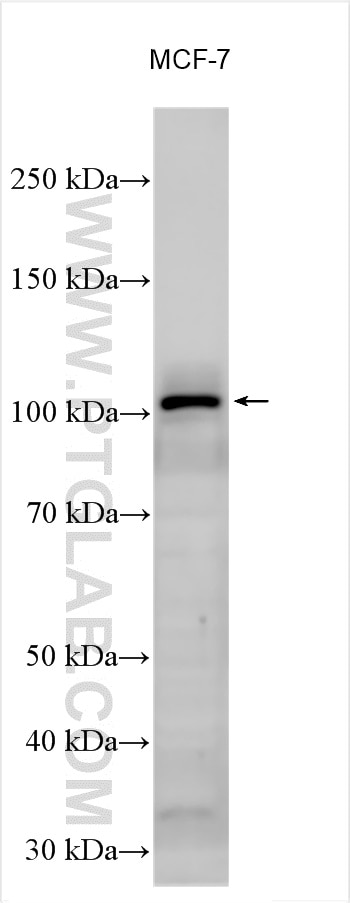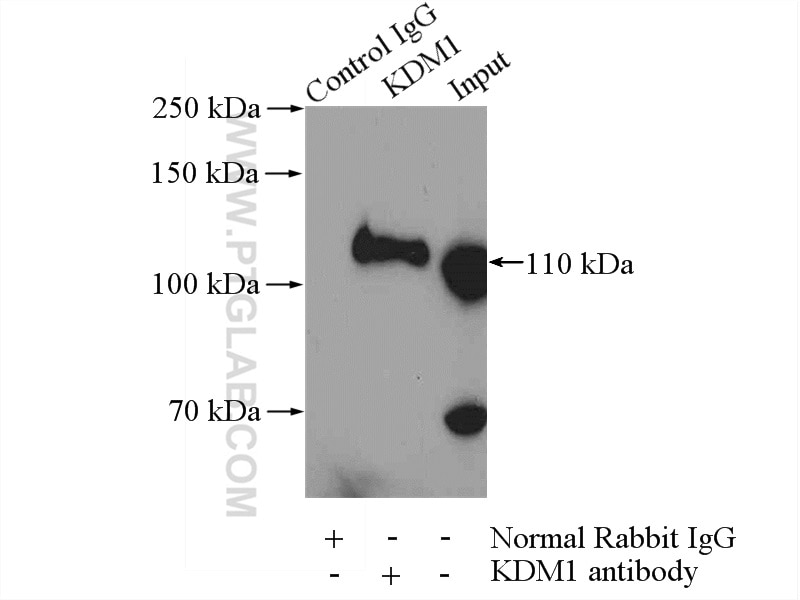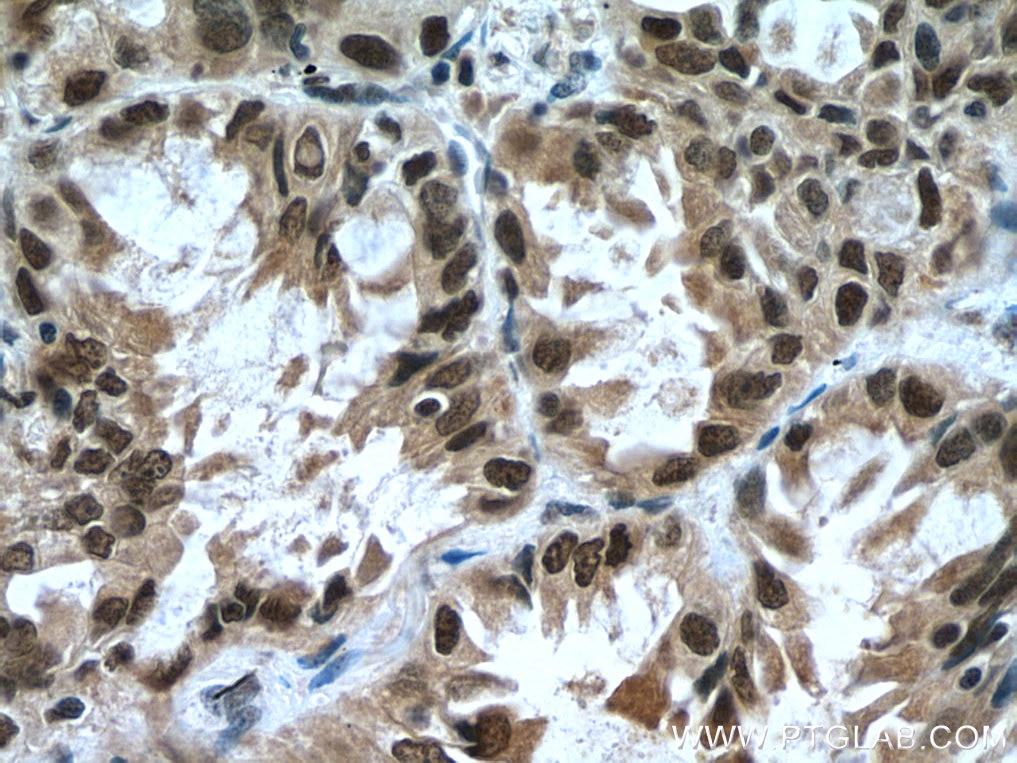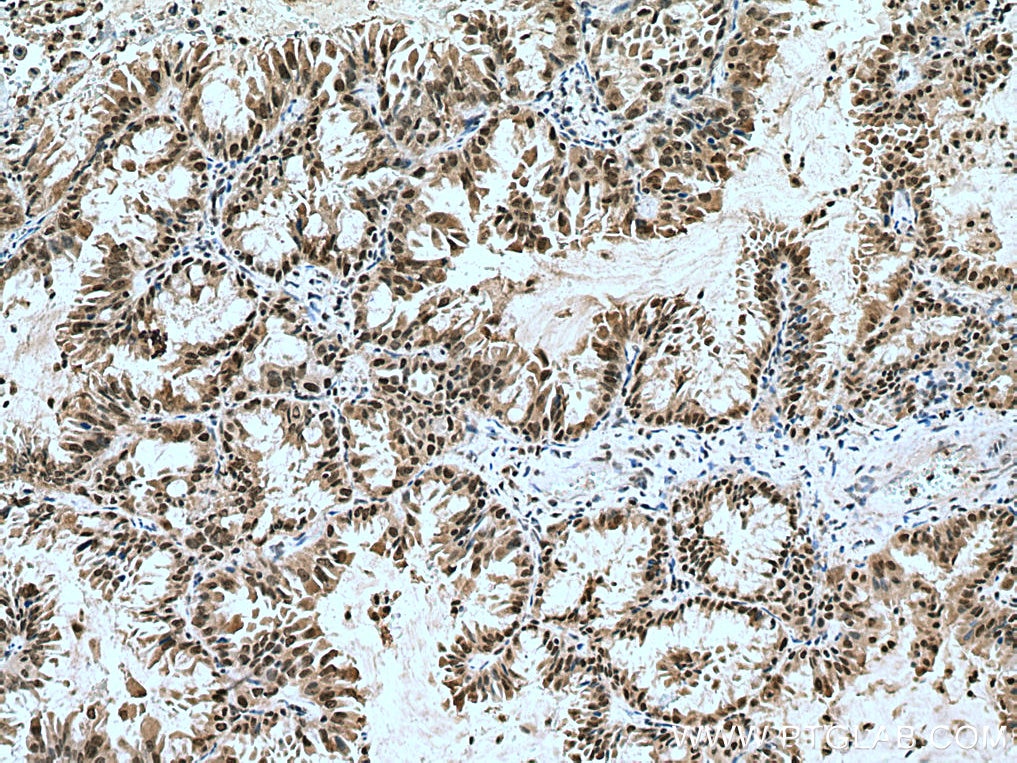- Featured Product
- KD/KO Validated
KDM1 Polyklonaler Antikörper
KDM1 Polyklonal Antikörper für WB, IHC, IP, ELISA
Wirt / Isotyp
Kaninchen / IgG
Getestete Reaktivität
human, Maus
Anwendung
WB, IHC, IP, ELISA
Konjugation
Unkonjugiert
Kat-Nr. : 20813-1-AP
Synonyme
Geprüfte Anwendungen
| Erfolgreiche Detektion in WB | MCF-7-Zellen |
| Erfolgreiche IP | HeLa-Zellen |
| Erfolgreiche Detektion in IHC | humanes Lungenkarzinomgewebe Hinweis: Antigendemaskierung mit TE-Puffer pH 9,0 empfohlen. (*) Wahlweise kann die Antigendemaskierung auch mit Citratpuffer pH 6,0 erfolgen. |
Empfohlene Verdünnung
| Anwendung | Verdünnung |
|---|---|
| Western Blot (WB) | WB : 1:2000-1:16000 |
| Immunpräzipitation (IP) | IP : 0.5-4.0 ug for 1.0-3.0 mg of total protein lysate |
| Immunhistochemie (IHC) | IHC : 1:50-1:500 |
| It is recommended that this reagent should be titrated in each testing system to obtain optimal results. | |
| Sample-dependent, check data in validation data gallery | |
Veröffentlichte Anwendungen
| KD/KO | See 2 publications below |
| WB | See 10 publications below |
| IHC | See 1 publications below |
Produktinformation
20813-1-AP bindet in WB, IHC, IP, ELISA KDM1 und zeigt Reaktivität mit human, Maus
| Getestete Reaktivität | human, Maus |
| In Publikationen genannte Reaktivität | human, Maus |
| Wirt / Isotyp | Kaninchen / IgG |
| Klonalität | Polyklonal |
| Typ | Antikörper |
| Immunogen | KDM1 fusion protein Ag14778 |
| Vollständiger Name | lysine (K)-specific demethylase 1 |
| Berechnetes Molekulargewicht | 876 aa, 95 kDa |
| Beobachtetes Molekulargewicht | 110 kDa |
| GenBank-Zugangsnummer | BC040194 |
| Gene symbol | KDM1 |
| Gene ID (NCBI) | 23028 |
| Konjugation | Unkonjugiert |
| Form | Liquid |
| Reinigungsmethode | Antigen-Affinitätsreinigung |
| Lagerungspuffer | PBS with 0.02% sodium azide and 50% glycerol |
| Lagerungsbedingungen | Bei -20°C lagern. Nach dem Versand ein Jahr lang stabil Aliquotieren ist bei -20oC Lagerung nicht notwendig. 20ul Größen enthalten 0,1% BSA. |
Hintergrundinformationen
Lysine specific demethylase 1 (LSD1/BHC110/KIAA0601/p110b/AOF2/KDM1) is an amine oxidase that catalyzes histone demethylation via a flavin adenine dinucleotide (FAD)-dependent oxidative reaction(PMID:19703393). This protein belongs to the flavin monoamine oxidase family. Its structure and function is conserved from yeast to human and it is typically associated to CoREST, a corepressor protein, and histone deacetylases HDAC1 and HDAC2. Human LSD1 consists of 852 amino acids and comprises an N-terminal SWIRM domain, involved in protein interactions, and a C-terminal amine oxidase domain, which contains an insertion that forms the CoREST interacting site (the so-called tower domain )(PMID:20164337). It has 2 isoforms produced by alternative splicing with the calculated molecular mass of 93-95 kDa and apparent molecular mass of 110 kDa.
Protokolle
| PRODUKTSPEZIFISCHE PROTOKOLLE | |
|---|---|
| WB protocol for KDM1 antibody 20813-1-AP | Protokoll herunterladen |
| IHC protocol for KDM1 antibody 20813-1-AP | Protokoll herunterladenl |
| IP protocol for KDM1 antibody 20813-1-AP | Protokoll herunterladen |
| STANDARD-PROTOKOLLE | |
|---|---|
| Klicken Sie hier, um unsere Standardprotokolle anzuzeigen |
Publikationen
| Species | Application | Title |
|---|---|---|
Cancer Res HBXIP and LSD1 Scaffolded by lncRNA Hotair Mediate Transcriptional Activation by c-Myc. | ||
Int J Mol Sci The Lysine Specific Demethylase-1 Negatively Regulates the COL9A1 Gene in Human Articular Chondrocytes.
| ||
iScience Matrix stiffness aggravates osteoarthritis progression through H3K27me3 demethylation induced by mitochondrial damage | ||
J Biol Chem The Deubiquitinase USP28 Maintains the Expression of the Transcription Factor MYCN and Is Essential in Neuroblastoma Cells | ||
Cancer Cell Int 4,5-Dimethoxycanthin-6-one is a novel LSD1 inhibitor that inhibits proliferation of glioblastoma cells and induces apoptosis and pyroptosis. |
Rezensionen
The reviews below have been submitted by verified Proteintech customers who received an incentive for providing their feedback.
FH Veronica (Verified Customer) (06-03-2025) | Needs improvement. Can work for total extrct but I won' recommend it for testing mitochondria isolation purity or nuclei isolation.
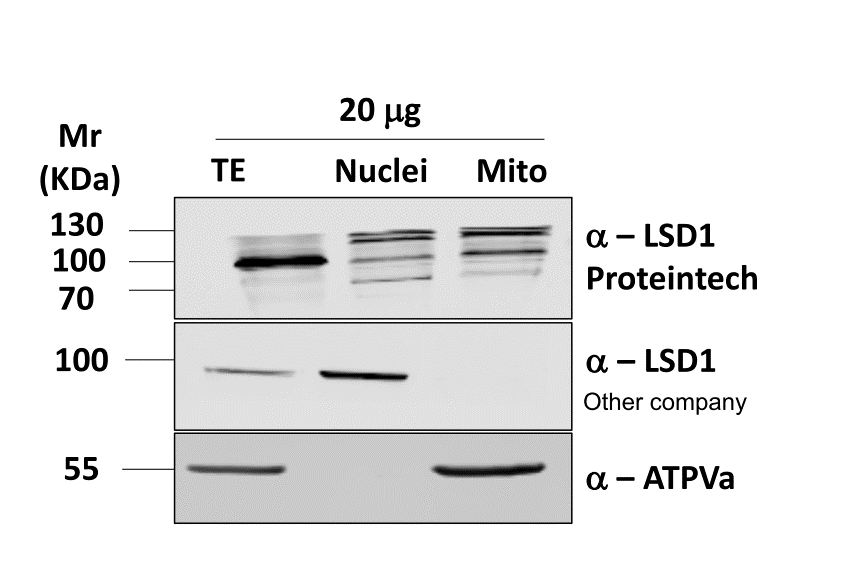 |
